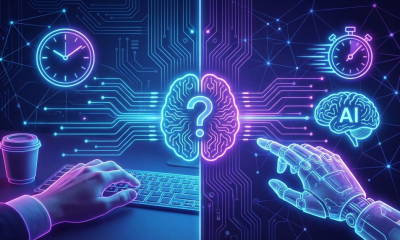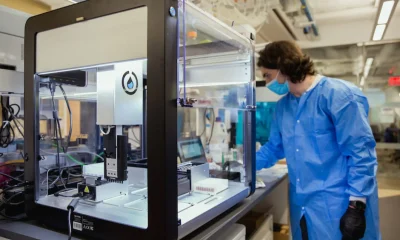Funding
Investments by Tech Giants In Artificial Intelligence is Set to Grow Further

Investment figures into artificial intelligence are growing exponentially each year. According to the market researchers at Markets and Markets, the current estimate is that the AI market will reach $191 billion by the year 2025. The investment number for 2018 was $21.5 billion.
Taking a look at the phenomenon, British specialist publication TechWorld took a look at how 12 of the world’s technological giants are investing in the development of artificial intelligence. Here we present the current six leaders in that field.
Nvidia – One of the largest chipmakers is at the same time one of the most serious investors into AI technology, as chips are key to pushing the technology forward. As noted, “AI requires more computational power than traditional algorithms, so heavy investment in new chip designs is an industry imperative.” So far, Nvidia has concentrated its AI investments in the technology’s use in the automotive industry, robotics, as well as the construction industry and healthcare.
Nvidia’s partnership with Nuance uses deep learning chips and a platform to bring AI to medical imaging. “The AI-powered imaging service enables medical professionals to use new tools to analyze x-rays and other needs in radiology.”
Intel – They recently invested $117 million in 14 startups that are developing AI platforms. In 2016 Intel also acquired Nervana and Movidius, which led to the lunch of Nervana Neural Network Processor (NNP) in 2019. This is processor is specially designed “to accelerate the training and inferences from AI models.”
In a blog post, VP and GM of the artificial intelligence products group at Intel said the following:
“In an AI-empowered world, we will need to adapt hardware solutions into a combination of processors tailored to specific use cases – like inference processing at the edge – and customer needs that best deliver breakthrough insights.”
Google’s CEO Sundar Pichai, explained in 2016 that “In an AI-empowered world, we will need to adapt hardware solutions into a combination of processors tailored to specific use cases – like inference processing at the edge – and customer needs that best deliver breakthrough insights.”
DeepMind, AI startup which Google bought in 2014 for $400 million has been used for, among other things, “to find the quickest route between underground stations, defeat champion players of the board game ‘Go’, and to improve healthcare through a series of controversial agreements with the NHS.”
At the same time, AI has a key role in a number of Google’s products like Google Mail or Google Assistant.
Amazon’s use of AI ranges from its online recommendations engine to using robots in its warehouses. Its most developed use of consumer-oriented AI lies with Alexa “the company Amazon’s intelligent voice assistant, uses neural networks to power natural language processing that analyses the human voice and returns an appropriate response.”
“Amazon has also brought machine learning to AWS. Customers can use Lex to build conversational interfaces, Polly to turn text into speech, Rekognition to add images analysis to applications, Comprehend to find insights and relationships in text, or SageMaker to build, train, and deploy machine learning models at scale.”
Microsoft’s large-scale investments into AI went a step forward when the company created Artificial Intelligence and Research Group that encompasses the Windows, Office, and Azure business units.
Along with it, in 2016 Microsoft launched Microsoft Ventures, a fund specifically devoted to AI startups. Since then, the company’s AI investments grew constantly, when only in 2018 Microsoft bought five AI tech companies.
This year the company announced plans to “invest $1 billion in OpenAI, a San Francisco-based company. It also announced a two-year partnership to develop AI supercomputing technologies on Microsoft Azure.”
Apple seems to be trying to catch up with its competitors as far as AI technology is concerned as it “recently hired Google’s chief of search and artificial intelligence, John Giannandrea, to run its machine learning and AI strategy.”
The company has also started investing in a wider range of AI startups, like Emotient, which produces facial recognition technology that can detect how customers reaction to ads, Vocal IQ, which provides a platform for voice interfaces, and Silk Labs, which makes AI software that can fit in consumer devices.
Apple has also come up with an academic paper that focuses on the use of AI in protecting user data and providing transparency.
The rest of the list is available here.












